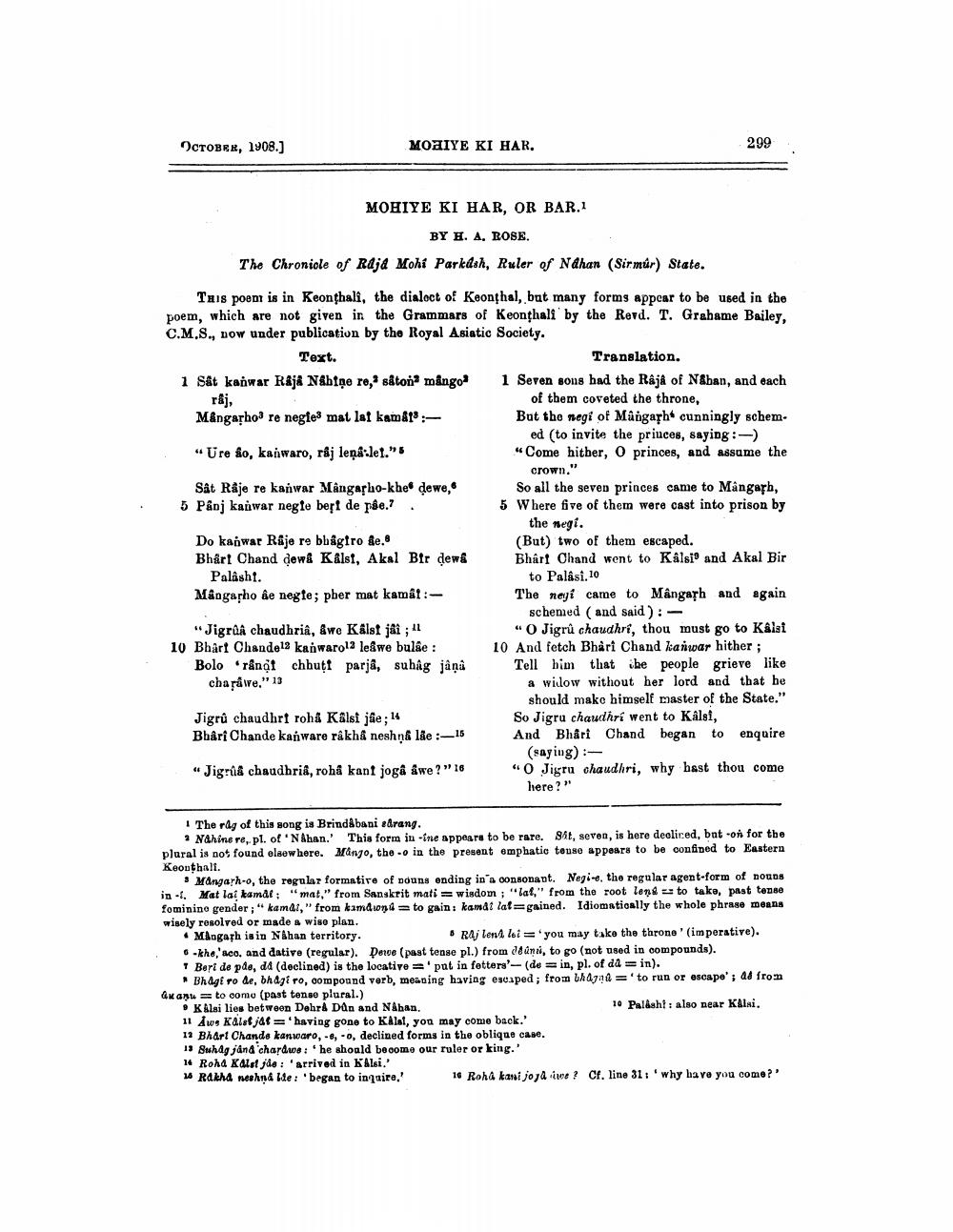________________
OCTOBER, 1908.)
MOHIYE KI HAR.
299
MOHIYE KI HAR, OR BAR.1
BY H. A, ROSE.
The Chroniole of Rajd Mohi Parkdsh, Ruler of N dhan (Sir múr) State.
Tuis poem is in Keonghali, the dinloct of Keonthal, but many forms appear to be used in the poem, which are not given in the Grammars of Keonthali by the Revd. T. Grahame Bailey, C.M.S., now under publication by the Royal Asiatic Society. Text.
Translation. 1 Sat kanwar Raja Nahtạo ro, stona mângot 1 Seven sons had the Raja of Nában, and each raj,
of them coveted the throne, Mångaphoë re negfes mat lat kamat® :
But the negi of Mangaph cunningly schem.
ed to invite the princes, saying :-) "Ure &o, kaiwaro, râj leņá:let."
"Come hitber, O princes, and assume the
crown." Sat Raje re kanwar Mångapho-khe dewe, So all the seven princes came to Mångarh, 5 Pânj kanwar negte bept de pae.? .
5 Where five of them were cast into prison by
the negi. Do kanwar Raje re bbågtro fe.
(But) two of them escaped. Bhirt Chand dewê Kilst, Akal Bir dewa Bhart Chand went to Kálsie and Akal Bir Palasht.
to Palasi.10 Mångapho âe negfe; pber mat kamat:
The neyi came to Mângash and again
schemed (and said ) :"Jigrua chaudhriâ, &we Kälst jäi ; 11
" Jigrů chaudhri, thou must go to Kalsi 10 Bhart Chandel2 kanwarola lekwe bulâe : 10 And fetch Bhari Chand kanwar hither; Bolo rânột chhutt parja, suhag jâņa Tell him that he people grieve like charawe." 13
a widow without her lord and that he
should make himself master of the State." Jigrû chaudhrt rohả Kälsi jae ; 14
So Jigru chaudhri went to Kalsi, Bbâri Chande kanware râkh nesh & le : 15 And Bhari Chand began to enquire
(saying): "Jigrû& chaudhriâ, rohů kant jogå iwe?"16 "O Jigru chaudhri, why best thou come
here?
1 The ray of this song is Brindabani Arang.
• Nahinere, pl. of 'N Aban.' This form in wine appears to be rare, 811, seven, is here declined, bat-on for the plural is not found elsewhere. Mango, theo in the present emphatio touno appears to be confined to Eastern Keonghali.
Mangarh-o, the regular formative of nouns ending in a consonant. Negi-e, the regular agent-form of nouns in. Mat lai kamal: "mat," from Sanskrit mati = wisdom ; "lat," from the root lend to take, past tense fominino gender;" kamal," from kamdund=to gain: kamdi lal=gained. Idiomatioally the whole phrase means wisely resolved or made a wiso plan. • Mdogaph is in Nihan territory.
Raj len1 loi = ' you may take the throne' (imperative). 6-kho,'aco, and dative (regular). Dere (past tense pl.) from dni, to go (not used in compounds).
Bert de pde, da (declined) is the locative='pat in fotters'-(do in, pl. of dd = in).
Bhagi ro de, bhagi ro, compound vorb, meaning having escaped; from oldgad 'to run or escape'; ad from Akanu = to como (past tense plural.) Kalsi lies between Dehra Dan and Nában.
10 Palasht: also near Kalni, 11 Aws Kalsfjaf='having gone to Kalat, you may come back.' 11 Bhart Chande kanwaro, -, -, declined forms in the oblique case. 13 Buhag jând chardws: he should become our ruler or king.' 14 Rohd Kalot jas : 'arrived in Kalsi." 16 Rakhd nehná lie: 'began to inquire.' 16 Roha kani joise ? Cf. line 31: 'why have you como?'




